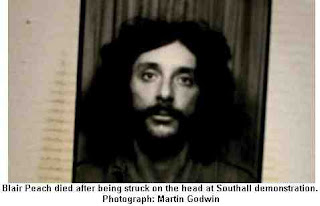
Coroner & British Establishment Covered Up Peach’s Murder
None are so good at effecting a cover-up as the British Establishment. Blair Peach, an anti-fascist activist, was murdered by the Special Patrol Group in 1979 protesting against an NF election meeting. This group of thugs were responsible 30 years later for the murder of Ian Tomlinson at the G20 Protest. Their name changed but not their methods.
Unfortunately there was no CCTV at the time of Blair Peach’s death. But we all know who was responsible. Now we know for definite that the Coroner, John Burton, not only formed his view well in advance but did his best to marshall opposition to the very case that he was being presented with. Nor of course is this an isolated example.
The first Bloody Sunday investigation was conducted by Lord Widgery the Chief Justice. He too had private discussions and understandings with Ted Heath, then Prime Minister, as to what was in his report. Covering up the truth is second nature to the British establishment whilst at the same time effecting shock-horror at the fact that anyone could believe in such conspiracies!
Thirty years later, Coroner’s courts are still being presided over by bigoted defenders of the Establishment. Many are legally untrained and are no better than the ordinary conservative magistrate, except they are in a position to do even more damage. Coroners have an unbroken record of supporting police violence and malpractice.
The following article is taken from the Guardian of 22.1.10.
Tony Greenstein
Doctor dismissed claims that Peach was killed by officer as political ‘fabrication’ before inquest had finished
Government officials withheld a document relating to the death of Blair Peach, the anti-fascist campaigner widely believed to have been killed by police in 1979, because they feared it would portray the coroner as biased and lend weight to calls for a public inquiry.
Peach, a 33-year-old teacher from New Zealand, died after being struck on the head at a demonstration against the National Front in Southall, west London. Witnesses said they saw him being attacked by police but after an internal investigation by the Metropolitan police no officers were charged. sdfsddf
df
The inquest, at which several suspected officers gave evidence, controversially returned a verdict of “death by misadventure“, and the coroner, the late Dr John Burton, was accused by Peach supporters of prejudicing the jury.
Documents held at the National Archives at Kew reveal senior civil servants became concerned after discovering Burton had penned an “unpublished story” about the Peach death which railed against what the coroner saw as a leftwing campaign to destabilise the legal establishment.
Burton had also written to ministers before the end of the inquest, dismissing the belief that Peach was killed by an officer as political “fabrication“. Fearing a public controversy if his leanings were made public, Home Office officials silenced Burton, the documents reveal. The Peach case will come under renewed scrutiny with the release of a three-decade old report written by Commander John Cass, the Metropolitan police officer who investigated the death.
dfsf
The document is being reviewed by the Crown Prosecution Service prior to being made public.
The Met commissioner agreed to release the Cass report last year after Ian Tomlinson, a passer-by at the G20 protests in London, died of internal bleeding after being attacked by a police officer. The incident, which was caught on film obtained by the Guardian, prompted comparisons with the Peach case.
sdfsafd
Burton began writing to ministers about what he believed was “a widespread campaign to damage the institutions of the law” in January 1980, before the inquest had finished.
In letters to the home secretary, lord chancellor and attorney-general, he complained that an organised and well-funded campaign was spreading disinformation about the death. He criticised media organisations, including the BBC, which he accused of “biased propaganda”.
sdfsdfs
Referring to some of the 11 witnesses who said they saw police attacking Peach, he noted how some were “totally politically committed to the Socialist Workers Party” and concluded: “The witness statements show that the story of the killing [of Peach] is a fabrication. This is a matter of fact and not of opinion.”
After the verdict, Burton authored a lengthy article entitled The Blair Peach Inquest – the Unpublished Story and told civil servants he planned to disseminate the report to fellow coroners via the Coroners Society’s annual report. A Home Office official noted how Burton was “extremely irate” at the way in which he thought the inquest had been hijacked by the “extreme left”.
When his unpublished report was circulated in Whitehall in June 1980, it caused alarm. “I am a little disturbed at the proposal,” one official wrote, “as I feel that if [his article] fell into the wrong hands it would be used to discredit the impartiality of coroners in general and Dr Burton in particular.”
Another senior official agreed: “It only needs one leak for a great deal of harm to be done – not only to the standing of coroners but also in respect of the home secretary’s decision that a public inquiry [into Peach’s death] should be resisted …
“An article like this would be a heaven-sent opportunity to those who wish to get maximum publicity out of this incident to argue that the coroner was biased and for this reason the inquest was unsound.”
The civil servants met with Burton on to dissuade him from going public. After the meeting – and with apparent relief – an official relayed the news colleagues. “He accepted our advice that the whale which exposes his surface invites harpoons, and agreed not to publish.”
Burton’s seven-page report is a description of Peach’s death and the subsequent inquest which, at times, implies a hostility toward Peach supporters. He complains about “the usual demonstrations by the usual people” outside the courtroom, and expresses frustration at what he saw his inability to control contemptible reports in the media.
He dismissed some witneses as telling “palpable lies” and, in an apparent reference to Sikhs who gave testimony, complained that some “did not have experience of the English system” to give reliable testimony. In contrast, he appeared to have more sympathy for the officers at the scene of Peach’s death, even though there were also inconsistencies in their evidence.
“Many policemen pointed out that in such a situation one looked upwards for uncoming bricks and not around to see what others were doing,” he wrote.
Peach supporters have long claimed that Burton was prejudiced, citing many of his official interventions before and during the inquest.
He initially resisted calls for a jury sit at the inquest – a decision overruled by the court of appeal.

